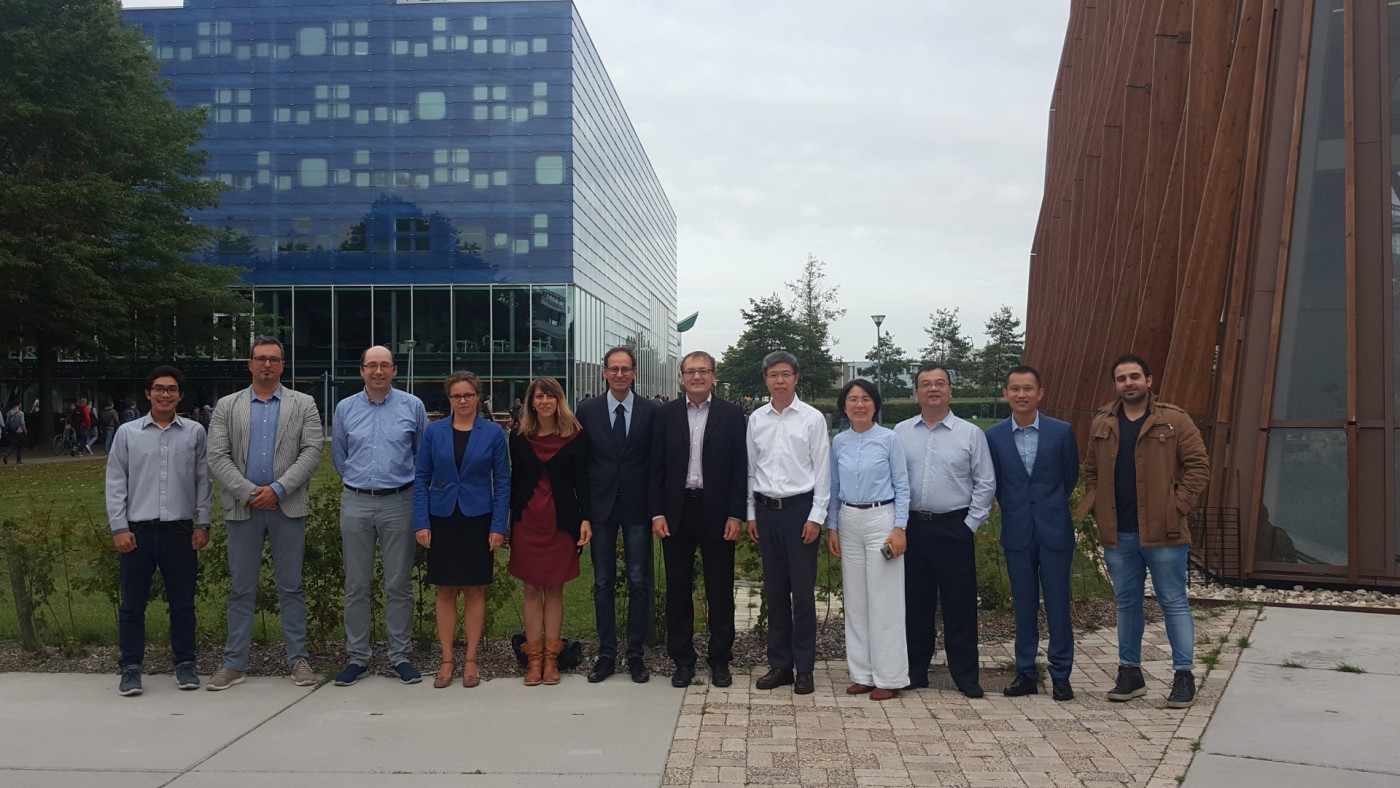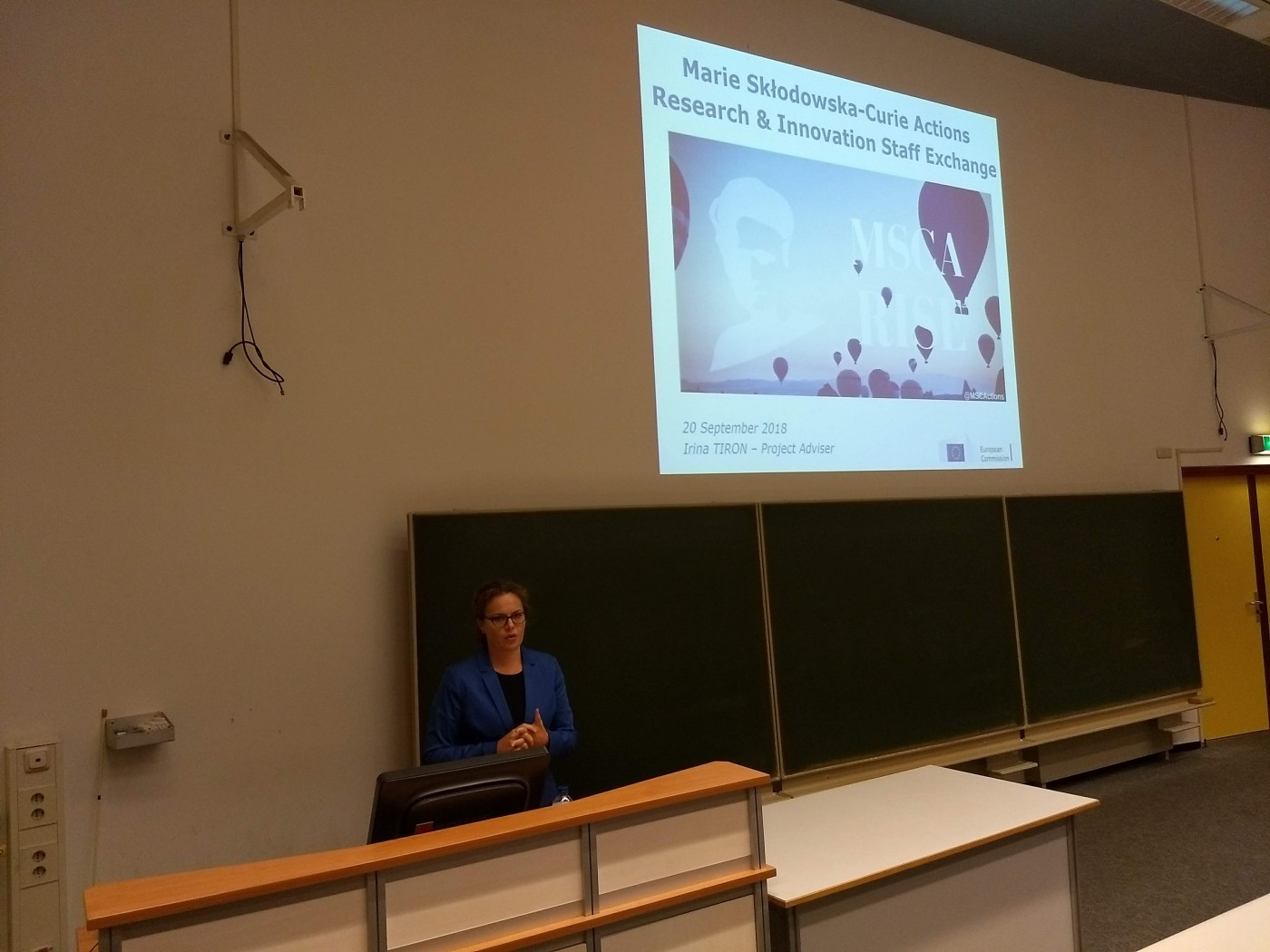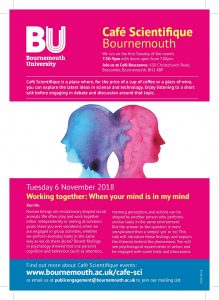
Doctoral College Santander Mobility Awards | Victoria Nicholls Awardee Report

Latest research and knowledge exchange news at Bournemouth University


On Wednesday the Government announced their intention to sell off another set of student loans (written statement here). Angela Rayner Labour’s Shadow Education Secretary was granted an Urgent Question within Parliament to raise the sale and requested a statement from Universities Minister Sam Gyimah. Sam stated:
Angela Rayner continued to question the Minister stating the sale related to £4 billion of the student loan book and requesting for a valuation of the loans up for sale (it wasn’t provided). She also highlighted that the National Audit Office findings suggested the DfE made a loss of £900 million on the previous student loan book sale, with £600 million in future income lost. Finally she asked:
The Lords were also granted a debate on the topic and picked up where Angela Rayner left off.
MoneySavingExpert.com immediately blogged to reassure students their repayments wouldn’t be affected by the proposed sale. MoneySupermarket have a breakdown of student spending which highlights a £142 weekly shortfall in the student loan against outgoings.
Wonkhe report: Higher education staff who are EU residents are to be prioritised in a new phase of the EU Settlement Scheme pilot, which will open in November. Eligible to apply are those who are employed by or work at a higher education institution or overseas higher education institution in the UK which is classified as such on the Tier 4 Register of licensed sponsors. The new phase will be a further pilot to scale up the testing of the scheme in addition to HE staff it also covers the health and social care sector. The new phase will open on November 1 and will run until 21 December this year.
Alistair Jarvis, Chief Executive of Universities UK, stated:
“There are nearly 50,000 EU nationals working in UK universities and they make a vitally important contribution to our campuses and communities. Many leading researchers and key university staff in the UK are from other EU countries. This enables our universities to maintain their world-class excellence in teaching and research. Highly trained international technical, professional and support staff also play an important role in our universities.
“We welcome the news therefore that they will be able to obtain settled or pre-settled status as one of the earliest groups in the scheme. This will provide much needed clarity for our EU staff and for universities. It is vital for our economy and society that the UK retains and continues to attract the best and brightest from across Europe post-Brexit.
The Immigration Minister also stated the government’s intention to double the Immigration Health Surcharge (HIS) to £400 per year (or £300 per year for students). This change will require ratification in Parliament by both the House of Commons and the House of Lords.
Next Tuesday the Education Committee will meet Pepper the robot who will answer questions in a session on the Fourth Industrial Revolution. Pepper is part of an international research project developing the world’s first culturally aware robots aimed at assisting with care for older people. The Committee will hear about her work with students across the faculties at Middlesex University, including a project involving teaching primary level children, and what role increased automation and robotics might play in the workplace and classroom of the future. After a demonstration by Pepper, the Committee will explore with witnesses, including those from Middlesex University, how robots can be used to support learning, and the skills needed to adapt to the growth in artificial intelligence and automation.
University Technical Colleges (UTCs) are in the news again with the Guardian drawing on the Education Policy Institute (EPI) report which finds UTCs ineffective as 50% of students drop out. UTCs are for 14-19 year olds, with a strong focus on technical education. They are sponsored by universities and supported by employers. The EPI report notes that there are 50 UTCs open in England. An additional 10 having closed or fundamentally changed into a different institution type in recent years.
UTCs: provision and characteristics
Progress and outcomes of students in UTCs
Supporting skills needs in the economy
Recommendations
Last week Nick Gibb, Minster of State for School Standards stated the UK’s spending on education was the third highest in the world. It hit the headlines as it controversially included university student tuition loans as well as fees paid by private school pupils and positively misrepresented literacy rankings. The UK Statistics Authority criticised here, the letter highlighting it was the fourth time in the last 12 months the DfE has misused statistics. Damian Hinds, Secretary of State for Education, responded here providing alternative statistics to blur the lines of the previous misuse. Whereas the Permanent Secretary within the DfE, Ed Humperson, was willing to hold his hands up and say they’ll do better in this letter.
From Research Professional: The House of Commons science and technology committee has published the written evidence for its ongoing inquiry into the balance of UK research funding. This inquiry was launched in July, two months after UK Research and Innovation published a strategic prospectus in which it announced that it was carrying out an internal review of the balance of funds between the research councils, Research England, Innovate UK and interdisciplinary research. It seems that UKRI would like to alter the balance in favour of more research across disciplinary boundaries and possibly more research that yields impact in its many forms.
It is interesting to look at who submitted evidence – not very many universities, although the Russell Group (and some of their members individually), UUK and GuildHE made submissions, alongside many of the Societies and Academies, the Wellcome Trust etc. So did the Department for BEIS.
A thought provoking blog on Wonkhe this week: Beyond school qualifications: how to make admissions truly inclusive. It tackles the false positives (admitting a student when it would have been better to decline) and false negatives (not offering to a student who would have done well) and considers the influence of a range of WP factors. The article favours foundation years to tackle the false negatives, and considers how efforts could be scaled up to admit on a different basis for a wider range of courses. It also highlights the pros and cons of the radical French université open access system.
The Office for Students published an early evaluation of the Addressing Barriers to Student Success programme covering the first year of programme delivery. It looks at how the programme is working, lessons learnt, and potential for cross-institutional partnerships as enablers for trialling and scaling up as well as the organisational and pedagogical approaches that seek to address differential student outcomes. Figure 3.5 on page 22 lists some of the successful activities which have addressed student success so far and page 33 has a what works diagram:
Finally the recommendation is for a three year programme (rather than the intended two) otherwise the results of the interventions will now be known and that the OfS should consider the academic calendar when funding programmes of this nature.
Parliamentary Questions
This week there were parliamentary questions on whether Pupil Premium is being used to supplement core funding, on the opt-in requirement for universities to share student mental health status information with parents, and on transition to university (mental health). Another question tackled the recruitment of Social Mobility Commissioners, the answer simply stated the recruitment was ongoing and no information would be released until the process concluded (and a further ask on the Commission recruitment attempted to establish how many applicants were solicited or unsolicited – same no response was given). . Sam Gyimah also answered a parliamentary question on student mobility study abroad programmes responding that such schemes still focus on the UK participating in the Erasmus successor programme. A further question on unconditional offers highlighted the tasking of the OfS to assess the impact unconditional offers may have on A level attainment. Finally there was a question on childcare support:
Q- David Simpson: To ask the Secretary of State for Education, whether his Department has a policy on helping students with children to study at university while providing childcare support.
A – Sam Gyimah:
Birkbeck has announced that it will no longer participate in UK league tables. Their statement notes good REF outcomes and a sliver TEF, but says that their league table position “gives a totally misleading view of the College”.
This is really a criticism of the over-simplified view that league tables give, compared to (say) the TEF (much criticised in its own right, of course, but much more nuanced). The first point above is one that will resonate with many across the sector. Progression from year 1 to year 2 is of course a metric in the TEF, which uses benchmarks so that Birkbeck would not be penalised for its model.
Advance HE published the Postgraduate Research Experience Survey 2018. They note that 16,000 postgraduates responded to the survey and list the key findings as:
The OfS have also issued an invitation to tender for a taught postgraduate student survey. It is described as an exploratory sample based survey intended to gather responses from around 30,000 PG students.
To accompany the tender announcements Conor Ryan, from the OfS wrote a Wonkhe blog: Listening to the postgraduate student voice.
Advance HE will publish the Postgraduate Taught Experience Survey (PTES) later this month, and the UK Engagement Survey next month.
Research Professional continues what might be called a campaign to call the Minister out on his pronouncements on free speech. The latest was in the playbook last week.
Playbook readers are familiar with the occasions it has been our journalistic duty to fact-check the claims of the universities minister Sam Gyimah during his campaign for free speech on campus. It was a surprise, then, to read over the summer an interview with the minister, given to the think tank Bright Blue, in which he said he had “received countless emails and letters from students saying that free speech on their campus is being threatened or impeded”. Wondering what amounted to “countless” these days, Playbook submitted a freedom of information request to the Department for Education. We asked for details of how many emails the minister had received from students on this topic. Sadly, the department was unable to comply with our request.
It said: “‘Free speech’ is such a widely applied term, it is impossible to narrow down all of the correspondence related to this subject.” We were told that the information was held in a “correspondence logging system” and not on a spreadsheet. “So the department estimates that the cost of complying with your request would exceed the cost threshold applicable to central government. This is £600 and represents the estimated cost of one person spending 3.5 working days locating, retrieving and extracting the information,” the department said.
Sexual Misconduct: AMOSSHE published an Insight report which researched students’ expectations of their universities following reporting or disclosure of sexual misconduct by or against students. The report notes a reluctance to report sexual misconduct and that emotional wellbeing support is crucial to student’s following disclosure.
UTCs: University Technical Colleges (UTCs) are in the news again with the Guardian drawing on the Education Policy Institute report which finds UTCs ineffective as 50% of students drop out.
Universal Credit: There has been significant hand wringing from the Conservatives over Universal Credit in recent times. FE News runs an article (written by Dept for Work and Pensions) on Universal Credit setting out the exceptions to the rule that full time students cannot claim Universal Credit.
A (short-ish) technical blog on HEPI this week discusses aligning Post-18 Entitlements and Apprenticeship Funding. It provides some facts and figures from level 2 to level 4. It concludes:
Arguably more thought needs to be given to publicly funded re-skilling entitlements. Potential options include:
EEA Workers: Those following the Migration Advisory Committee’s EEA workers investigation and reporting may find this UCEA webpage interesting. It brings together the major sources on the topic and publishes the UCEA red amber green briefing response to the committee’s report.
Brexit – No deal prep: On Friday the Government released more guidance for various sectors on how to prepare for Brexit should we leave the EU with no deal.
Chief Scientific Adviser (Foreign and Commonwealth Office): Professor Carole Mundell was announced as the new Chief Scientific Adviser. She will also continue in her role as Professor of Extragalactic Astronomy at Bath University. The Chief Scientific Adviser represents UK science interests internationally, using science relationships to deliver the UK’s foreign policy priorities. She will work closely with the UK’s Science and Innovation Network to facilitate links between British and international scientists to drive future economic growth; tackle global challenges such as Anti-Microbial Resistance, Patient Safety, girls’ education and to support the conservation and sustainable use of the Ocean.
To subscribe to the weekly policy update simply email policy@bournemouth.ac.uk
JANE FORSTER | SARAH CARTER
Policy Advisor Policy & Public Affairs Officer
66724 65070
Follow: @PolicyBU on Twitter | policy@bournemouth.ac.uk


Mr. Georgios Digkas, a PhD candidate of University of Groningen, the Netherlands, visited Bournemouth University, Bournemouth, UK. He shared his research on the area of Technical Debt with BU partners and colleagues on 27 September 2018. He is also working on EU FIRST project .
If you want to listen to his talk, please visit our EU FIRST project YouTube Channel .


A Bournemouth University team from the Faculty of Science and Technology visited University of Groningen for FIRST mid-term review. It was a very productive meeting with a lot of effective outcomes for research and knowledge exchange. Dr. Lai Xu and Dr. Paul de Vrieze are FIRST coordinators representing Bournemouth University and the team is pleased to announce that FIRST will continue to move towards a factory of the future for European Union.
If you want to know more about the project and get involved, please contact Dr. Lai Xu or Dr. Paul de Vrieze. You can also follow our social medial links on Facebook, Twitter, Instagram and YouTube Channel.

During the mid-term review meeting, the FIRST EU project advisor Irina Elena Tiron giving a talk on RISE projects. A useful instrument for researchers in EU (and beyond).

On 17 – 18 September 2018 Natalie Stewart (Doctoral College Research Skills and Development Officer), Thomas Stroud (Doctoral College Resources Administrator) and Emily Cieciura (RKEO Research Knowledge and Exchange Development Framework Facilitator) attended the Vitae Researcher Development International Conference, the largest global event dedicated to researcher development.
With around 400 delegates in attendance, the conference explored the latest policy development, future development in the sector and explored the opportunities and challenges of researcher development.
With an emphasis on how to meet the future development needs of researchers for a wide range of careers in and beyond academia, we came back more informed, connected and motivated to ensure Bournemouth University Postgraduate Research Students and Research Staff are provided with comprehensive, targeted and flexible researcher development programmes.
Three Minute Thesis UK Final
The UK National 3MT® Final was hosted at the conference gala dinner where six finalists from across the UK competed to win the coveted £3k grant to spend on a public engagement activity and a place on the Taylor & Francis Journal Editor Mentoring Programme. This year’s judge’s winner was Owen James, University of Edinburgh, with the winning presentation entitled ‘Human myelin in a dish’ and the people’s choice award went to Jamie Khoo with the emotive presentation ‘But is she pretty? How women respond to beauty ideals’. The 3MT® event is definitely a highlight of the conference; hopefully we can get BU PGRs represented in the coming years. Look out for the internal 3MT® event coming up this year. You can watch all of the semi-finalist 2018 presentations on the Vitae Website here.
Doctoral College Researcher Development Programme
The RDP is complementary to postgraduate research degrees here at BU and offers PGRs flexibility to develop their academic, professional and personal skills as and when required. It supports PGRs in gaining the skills needed to complete their research degree whilst also building on transferable skills for employment, whether in academia or beyond, in an increasingly competitive jobs market.
Offering over 150 on-campus workshops, e-learning, an interactive webinar series, and a range of additional online resources, and various events the RDP mirrors the Vitae Researcher Development Framework (RDF) which enables PGRs to tailor their individual developmental journey.
The RDP is open to all PGRs and, access to view the provisions offered on Brightspace is provided to PGR supervisors.
If you have any questions on the RDP please contact the Research Skills and Development Officers Natalie and Clare (pgrskillsdevelopment@bournemouth.ac.uk).
RKEO Research and Knowledge Exchange Development Framework
The RKEDF offers a range of opportunities for academics at all career stages to develop their skills, knowledge and capabilities in relation to research and knowledge exchange.
Attending the Vitae conference enables us to share in the best practice across the UK and globally, providing the impetus to embrace innovative researcher development approaches. In the last twelve months, for example, BU has launched a new Early Career Researcher Network, including its Brightspace community, seen successful cohorts for the Writing Academy, Research Council Development Scheme, piloted a new career-based pathway, with dedicated developmental support for ECRs, Mid-Career and Professorial researchers, benefited from inspirational external speakers, and hosted over 150 events ranging from funder briefings to STEAMLabs. Following discussion of your development requirements with your line manager and consideration of how the RKEDF can support these needs, the RKEDF is open to all BU academic staff, including those on fixed and PTHP contracts.
The RKEDF also references the Vitae Researcher Development Framework (RDF).
If you have any questions about the RKEDF, please contact Emily Cieciura, RKEDF Facilitator (RKEDevFramework@bournemouth.ac.uk).
Café Scientifique Bournemouth – We run on the first Tuesday of the month.
Cafe Scientifique is a place where, for the price of a cup of coffee or a glass of wine, you can explore the latest ideas in science and technology. Enjoy listening to a short talk before engaging in debate and discussion around that topic.
Join us on Tuesday 6 November from 7.30pm until 9.00pm (doors will open from 6.30pm):
We’ll be joined by Xun He to discuss – Working together: When your mind is in my mind.
Human beings are evolutionary shaped social animals. We often play and work together either independently or aiming at common goals. Have you ever wondered, when we are engaged in group activities, whether we perform everyday tasks in the same way as we do them alone? Recent findings in psychology showed that one person’s cognition and behaviour (such as attention, memory, perception, and action) can be shaped by another person who performs similar tasks in the same environment. But the answer to the question is more complicated than a simple ‘yes’ or ‘no’. This talk will introduce these findings and explain the theories behind the phenomena. You will see psychological experiments in action and be engaged with some tests and discussions.

Café Boscanova – 650 Christchurch Road, Boscombe, Bournemouth, BH1 4BP
If you have any questions please do get in touch. You can also follow us on Facebook and Twitter.
Plus, why not send us a request to be added to our Public Engagement mailing list and be the first to hear about all our events and activities.
We look forward to seeing you!
Café Scientifique Team

Places are going fast for our conference next month. See full programme here. If you would like to secure a place please register here.
See you there.
Café Scientifique – Tuesday 2 October- Facing our future self
Bournemouth Café Scientifique is turning 6 on Tuesday 2 October. To celebrate we have a fantastic talk from Dr Curie Scott about changing our attitudes to ageing. We’ll also have Birthday Brownies!
Join us on Tuesday 2 October from 7.30pm until 9.00pm (doors will open from 7.00pm):
Café Boscanova – 650 Christchurch Road, Boscombe, Bournemouth, BH1 4BP
Facing our future self

Dr Curie Scott
One in five people alive today will reach their 100th birthday. You are going to grow old but have you thought about it? Ageing is a taboo subject and older people are often stereotyped and overlooked. Dr Curie Scott invited people over 60 and students from Health & Social Care professional courses to four drawing workshops. Come and hear how drawing about ageing made a startling difference to their current lives. In terms of ageing, we cannot separate ourselves from our future older self, however much we want to do so. ‘They’ are the ‘we’ of the future.
If you have any questions please do get in touch. You can also follow us on Facebook and Twitter.
Plus, why not send us a request to be added to our Public Engagement mailing list and be the first to hear about all our events and activities.
We look forward to seeing you!
Café Scientifique Team
I recently had the opportunity to apply for a grant as principal investigator. The reason for writing this post today is to say thanks to everyone involved, including the RKEO staff, the Co-investigators (Paula Callus in particular), the partner institutions but also all colleagues who gave us suggestions, supporting and helping also if not involved (Isabella Rega and Richard Berger were some of these).
On reflection, I would have done all of it differently. More time was needed (possibly not when on Annual Leave and not night time), partners need to be in place well before the call is out, reference letters cannot be asked for last minute, etc. I made all (or almost all) the mistakes above, but I had a very clear idea about the project and I felt surrounded by enthusiastic colleagues who were happy to share their expertise with me. I now know I have still a lot to learn and I can’t wait for the next opportunity.
A good point was to take notes which will be used for next grant applications. Somehow it does not matter if we will get the funding at this first attempt, we are looking forward to improving the application and the project itself, which will require more research. Yes, applying for grants is not a boring task, there is a lot of research involved which brings new ideas and opens up opportunities, whether you get the funding or not.
I hope this post will be read as a positive gentle push to apply for grants and not only because it’s the Institution in need of more grants applications but because the process itself is incredibly enriching. I hope my colleagues enjoy their future grant applications as much as I did.
a+

There is an increasing emphasis on the need for researchers and sponsors to publish, and disseminate, the results of the clinical studies that they conduct. Timely disclosure of results is important ethically, morally, in the interests of research integrity and from a waste reduction perspective.
Dissemination of results, whether favourable or not, also achieves transparency – increasingly important from the perspective of the recent introduction of the GDPR.
The National Institute for Health Research (NIHR) have signed-up to the WHO’s joint statement on public disclosure of results from clinical trials. The policy sets out the expectations and support on offer in order for research communities to comply. The draft policy is available to read, with a quick survey open until 21st September, for you to have your say.
BU has access to the ClinicalTrials.gov system – get in touch for access and for the opportunity to register your study and results in the public domain.
Profs Matthew Bennett and Marcin Budka have just published the textbook Digital Technology for Forensic Footwear Analysis and Vertebrate Ichnology with Springer.

“There is no branch of detective science which is so important and so much neglected as the art of tracing footsteps.” Sherlock Holmes, Study of Scarlet.
Despite the fictional nature of Sherlock Holmes this statement rings true today. The study of footwear is neglected in modern forensic practice and does have much to offer. What it needs is an injection of technology and associated modern analytical tools. These tools are emerging from the digital revolution currently transforming vertebrate ichnology. Ichnology is the discipline of earth science which focuses on the study of trace fossils such as footprints. This book draws upon both disciplines (geology [ichnology] and forensic science) to show how the two have much to learn from each other especially with regard to the digital capture and analysis of footprints and footwear evidence.
This innovative book which is the culmination of research/innovation funded by the Natural Environment Research Council (NERC) and HEIF provides the practitioner with field and laboratory methods necessary for the collection, analysis and presentation of three-dimensional tracks (footprints) whether from a crime scene or a geological/archaeological excavation. It shows students, researchers and practitioners how to collect and analyse 3D data and take advantage of the digital revolution transforming ichnology. The book forms a natural methods focused complement to the successful text Fossilised Locomotion published by Springer 2014 and written by Professor Bennett.
The book is an illustration of Fusion in action combining professional practice, research and teaching. The team’s work is supported by the Home Office and National Crime Agency as well as several police forces and forensic units throughout the UK. Some of the contents have been co-created with students at BU and the volume will be used in teaching on a range of forensic science programmes at BU.
The National Institute for Health Research are in urgent need of psychiatrists and psychologists to peer review funding applications.
See the original tweet here advertising this opportunity, and how to apply here*.
*The link takes you to how to apply as a professional peer reviewer, from any clinical speciality. You can review for the NIHR for professional development (amongst other initiatives), and they need a wide range of expertise:
Home Instead is launching the Stay Nourished initiative in consultation with Professor Jane Murphy from BU’s Ageing & Dementia Research Centre.
See full article below:
https://www.express.co.uk/life-style/life/1000975/one-million-pensioners-summer-eating-every-meal-alone?platform=hootsuite
Click links for programme and registration form, spaces limited!
Programme for SIXTH Annual Wessex CRN and Regional BGS 18 Sept 2018 with sponsors v3
REGISTRATION FORM for 6th annual Wessex CRN Research BGS MEET